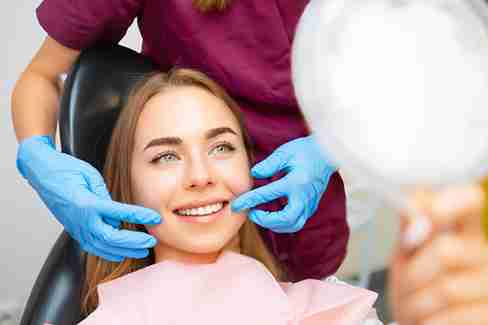Regular visits to the dentist are vital for maintaining good oral health, but many patients may not fully understand the scope of a comprehensive hygiene visit. These appointments are not only about cleaning your teeth, but they also involve thorough exams that help detect issues early and keep your smile in great shape. In this blog post, we’ll take an in-depth look at comprehensive hygiene visits, covering everything from deep cleaning to the thorough exams involved in the process. Understanding these visits can help you get the most out of your dental care and ensure that your teeth and gums stay healthy for years to come.
What is a Comprehensive Hygiene Visit?
It’s a complete assessment of your oral health, which includes both a deep clean and a detailed exam. These visits are essential for preventing dental problems and ensuring that any issues are detected early.
A typical hygiene visit with a hygienist in Crawley or dentist includes two main parts:
- The Deep Clean: This is the part that most people are familiar with, where plaque and tartar are removed from your teeth. However, it goes beyond what you may think of as a routine cleaning.
- The Detailed Exam: During the exam, your dentist or hygienist will check for various dental issues such as cavities, gum disease, and other conditions. They may also perform oral cancer screenings and take X-rays if needed.

Both elements of the visit are vital for long-term oral health, as they help prevent the buildup of plaque and tartar, detect issues early, and address any problems before they worsen.
The Deep Clean: Going Beyond the Surface
While brushing and flossing at home are essential for maintaining good oral hygiene, professional deep cleaning is a crucial part of a comprehensive hygiene visit. Here’s a breakdown of how a deep clean works:
1. Scaling
Scaling is the process of scraping away plaque and tartar that have built up on the teeth, especially below the gum line. Tartar, or calculus, forms when plaque hardens and is no longer removable by regular brushing. If left unchecked, tartar can lead to gum disease and tooth decay.
2. Root Planing
If your gums show early signs of gum disease, your dentist or hygienist will carry out root planing. This process smooths the surface of the tooth’s root, allowing the gums to reattach to the tooth. Root planing helps to remove any bacteria and rough spots that could cause further gum irritation and inflammation.
3. Polishing
After scaling and root planing, the teeth are polished to remove any remaining plaque and tartar. This also helps smooth the tooth surface, making it harder for bacteria to stick to the teeth.
The benefits of a deep clean go beyond simply making your teeth look and feel good. Regular deep cleaning can help prevent:
- Gum disease (gingivitis and periodontitis)
- Cavities
- Tooth decay
- Bad breath
If you haven’t had a professional clean in a while, you may be surprised at the noticeable difference it makes.
Detailed Exam: The Key to Early Detection
One of the most important parts of a comprehensive hygiene visit is the detailed exam. While cleaning your teeth is vital, the exam allows your dentist to spot potential issues early and prevent problems from becoming serious.
1. Checking for Cavities and Tooth Decay
Your dentist will carefully examine each of your teeth to check for any signs of cavities or tooth decay. If caught early, cavities can often be treated with a filling, preventing further damage to the tooth.
2. Gum Health Evaluation
Healthy gums are essential for overall dental health, so your dentist or hygienist will assess your gum health during your hygiene visit. They will look for indicators of gum disease, such as redness, inflammation, or bleeding. Additionally, measuring the depth of the gum pockets around your teeth can assist in detecting the early signs of gum disease.
3. Oral Cancer Screening
Your dentist will perform an oral cancer screening during the exam to check for any unusual lumps, bumps, or sores in the mouth. Early detection of oral cancer is key to improving the chances of successful treatment.
4. X-rays
In some cases, your dentist may recommend X-rays to get a closer look at your teeth and gums. X-rays help your dentist detect problems that aren’t visible during a regular exam, such as cavities between teeth or issues with the bone structure that supports your teeth.

What to Expect During Your Hygiene Visit
Understanding what happens during your hygiene visit can help ease any anxiety and prepare you for your appointment. Here’s a quick step-by-step breakdown of what you can expect during a comprehensive hygiene visit:
Before Your Visit
- Provide Your Dental History: Be prepared to answer questions about your dental health, any medications you are taking, or any changes to your health that might affect your oral care.
- Schedule Regular Visits: If it’s been a while since your last appointment, it’s important to schedule a visit with a dentist in Crawley for a full assessment.
During Your Visit
- Cleaning: Your hygienist will begin by scaling your teeth to remove plaque and tartar, followed by root planing if necessary.
- Polishing: After scaling, your hygienist will polish your teeth to leave them feeling smooth and clean.
- Exam: Once the cleaning is complete, your dentist will conduct a thorough exam, checking for cavities, gum disease, and other dental concerns.
- X-rays (If Needed): If there are any concerns about hidden problems, X-rays may be taken for a closer look.
After Your Visit
- Post-Cleaning Care: After your hygiene visit, your dentist or hygienist will provide recommendations for maintaining good oral hygiene at home. This might include tips on brushing, flossing, and using mouthwash.
- Scheduling Future Appointments: Most dental professionals recommend scheduling hygiene visits every six months to maintain optimal oral health.
Benefits of Regular Hygiene Visits
A comprehensive hygiene visit is not just a routine appointment; it’s an investment in your overall health. Here are a few key benefits of keeping up with regular hygiene visits:
1. Prevention of Serious Dental Issues
Regular visits to your hygienist in Crawley can help prevent issues such as gum disease, cavities, and tooth decay before they become major problems. Preventive care is always more affordable and less invasive than treatments for advanced conditions.
2. Better Oral Health
Routine cleaning and exams help maintain healthy teeth and gums, contributing to fresher breath and a brighter smile. Additionally, preventing gum disease reduces the risk of losing teeth later in life.
3. Cost Savings
Addressing issues early helps you steer clear of expensive treatments in the future, saving you both time and money.
Conclusion
Comprehensive hygiene visits are crucial for maintaining a healthy smile and preventing serious dental issues. By combining deep cleaning with detailed exams, your dentist or hygienist ensures your teeth, gums, and overall oral health are in top condition. Regular visits not only enhance your smile but also protect your overall well-being. If you’re searching for a reliable dental professional or a skilled hygienist in Crawley, schedule your next comprehensive hygiene visit today. At Crawley Dental, we’re dedicated to helping you achieve excellent oral health through personalised care. Book your appointment now and keep your smile healthy for years!









